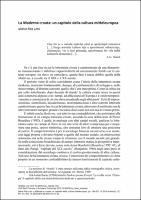Chapter La Moderna croata: un capitolo della cultura mitteleuropea
| dc.contributor.author | Leto, Maria Rita | |
| dc.date.accessioned | 2022-09-15T20:06:33Z | |
| dc.date.available | 2022-09-15T20:06:33Z | |
| dc.date.issued | 2019 | |
| dc.identifier | ONIX_20220915_9788864539102_53 | |
| dc.identifier.issn | 2612-7679 | |
| dc.identifier.uri | https://library.oapen.org/handle/20.500.12657/58257 | |
| dc.language | Italian | |
| dc.relation.ispartofseries | Biblioteca di Studi Slavistici | |
| dc.subject.classification | thema EDItEUR::J Society and Social Sciences::JH Sociology and anthropology::JHB Sociology | en_US |
| dc.subject.other | Croatian literature | |
| dc.subject.other | Modernism | |
| dc.subject.other | Moderna | |
| dc.subject.other | Pierre Bourdieu | |
| dc.subject.other | Mitteleuropa | |
| dc.title | Chapter La Moderna croata: un capitolo della cultura mitteleuropea | |
| dc.type | chapter | |
| oapen.abstract.otherlanguage | The Croatian Moderna is usually defined as the moment when Croatian literature catches up with the literary trends that were current in Europe at that time. This “turn to Europe” was made possible by a series of historical events as well as by the experiences of a number of Croatian students living abroad, who encouraged the transnational debate that would eventually revolutionize Croatian literary culture. We argue, using the terms of Pierre Bourdieu, that the transnational and cosmopolitan nature of Moderna made possible the genesis of an autonomous Croatian literary field. | |
| oapen.identifier.doi | 10.36253/978-88-6453-910-2.22 | |
| oapen.relation.isPublishedBy | bf65d21a-78e5-4ba2-983a-dbfa90962870 | |
| oapen.relation.isbn | 9788864539102 | |
| oapen.series.number | 43 | |
| oapen.pages | 9 | |
| oapen.place.publication | Florence |

